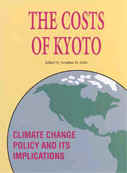The Costs of Kyoto
Climate Change Policy And Its Implications

In 1997, the Competitive Enterprise Institute set out to answer just that question. CEI sponsored a conference on the implications of an international treaty on global warming in July of that year. This conference examined recent scientific developments, the economic and distributional impacts of proposed policies, the impact of political pressure on climate research, and the implications of applying the precautionary principle to global climate change.
The book that sprung forth from that conference, The Costs of Kyoto: Climate Change Policy and Its Implications, explored the economic and social costs of an international climate treaty, the scientific basis for a treaty, and the broader implications the global warming issue has for environmental policy in the United States and abroad. Taken as a whole, these essays demonstrate that the risks of global warming may be less than the risks imposed by global warming policy.
With the Global Warming battleground heating up once again despite President Bush’s stated opposition to the Kyoto Protocol, CEI’s The Costs of Kyoto is as timely as ever. Click on the links below to download its various sections. To order actual copies of the book (and its companion video), follow the instructions at the bottom of the page.
INTRODUCTION: Jonathan H. Adler Competitive Enterprise Institute
PART I – DOMESTIC ECONOMIC IMPACTS
THE COSTS OF CLIMATE CHANGE POLICY: Wilbur Steger, CONSAD
WHAT CLIMATE CHANGE POLICIES MEAN FOR CONSUMERS: Fran Smith, Consumer Alert
IMPACTS ON WORKERS: Eugene Trisko, United Mine Workers Association
Click here to download the Introduction and Part 1 in PDF.
PART II: GLOBAL IMPACTS
GLOBAL IMPACTS OF AN GLOBAL CLIMATE CHANGE TREATY: David Montgomery, Charles River Associates
INTERNATIONAL IMPACTS – AN AUSTRALIAN VIEW: Brian Fisher, ABARE
IMPACTS ON THIRD WORLD DEVELOPMENT: Deepak Lal, UCLA
Click here to download Part 2 in PDF.
PART III: THE POLITICAL ECONOMY OF CLIMATE SCIENCE
THE STATE OF CLIMATE CHANGE SCIENCE: Roy Spencer, NASA
THE POLITICAL ECONOMY OF CLIMATE SCIENCE: Roger Bate, Institute of Economic Affairs
MEDIA COVERAGE OF CLIMATE CHANGE: David Murray, STATS
Click here to download Part 3 in PDF.
PART IV: POLITICAL ECONOMY OF CLIMATE POLICY
THE PRECAUTIONARY PRINCIPLE AND CLIMATE CHANGE: Wilfred Beckerman, University of Oxford
ECONOMICS AND CLIMATE POLICY: Robert Crandall, Brookings Institution
CONCLUSION: Fred L. Smith, Jr., Competitive Enterprise Institute
ABOUT THE AUTHORS
Click here to download Part 4 in PDF.